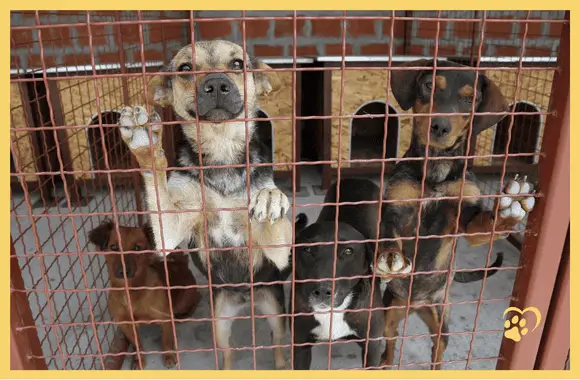The decision to give a dog from the shelter a new home can completely change the life of a dog - and the life of the owner. But unfortunately, prejudices and fears keep many people from adopting a four-legged friend. We will show you why these concerns are often unfounded and how rescuing a dog from the shelter can be a real enrichment for your life.
Myths and misconceptions about rescued dogs
Causes of behavior problems
Behavior problems in dogs can have many causes. Often they are due to bad experiences or lack of socialization in the past. These problems are not necessarily due to being in a shelter. In some cases, genetic factors, illness or pain can also influence a dog's behavior, as can experiences prior to being in the shelter.
Why don't all rescued dogs have behavior problems?
It is a common misconception that all shelter dogs are behaviorally challenged. However, this is not always the case. Many dogs in the shelter are well behaved and socialized, they were just surrendered for various reasons, such as relocation, allergies or financial difficulties of the previous owner. So there are just as many good-natured and unproblematic dogs in the shelter as there are those that need a little more help and support.
Training and socialization as a solution to behavior problems
If your adopted dog does have behavior problems, there are many ways to manage them. Training and socialization are essential to teach your dog how to behave in different situations. Use positive reinforcement and be patient. Professional dog trainers and behaviorists can give you valuable tips and advice to help your dog live a balanced life.
Adopting a shelter dog is a chance to help an animal in need. Every living creature needs time and support to adapt to new circumstances. With love, patience and the right education, your adopted dog will become a loyal companion.
Health problems with dogs from the shelter
The reality of health problems in rescued dogs
It is not uncommon for people to be concerned about potential health problems in dogs from shelters. However, it is a fallacy to believe that all rescued dogs necessarily suffer from serious health problems. Of course, there are dogs with pre-existing conditions, but many dogs in shelters are healthy and just waiting to find loving homes.
Health benefits of adoption
One of the advantages of adopting a dog from a shelter is the fact that these dogs have usually already been medically examined and cared for. This includes vaccinations, deworming and neutering if necessary. So, many basic health needs are already covered. Animal shelters work closely with veterinarians and can often give you important information about the health of the animal.
Preventive measures and treatment options
If your adopted dog has or develops health problems, there are many ways to deal with them. Preventative measures such as regular checkups with your veterinarian, a balanced diet and adequate exercise will help keep your dog healthy. For existing health issues, your veterinarian can provide you with treatment options and help you ensure the best possible care for your new four-legged friend.
A shelter dog can be just as healthy and full of life as any other dog. With a responsible attitude and the necessary medical care, you have the chance to give a shelter dog a happy and fulfilling life.

Difficulties with the adjustment
Why rescued dogs need time to settle in
Every dog, whether from a shelter or not, needs time to adjust to their new home and new people. Rescued dogs often have different experiences and backgrounds, which means they need even more time and patience to adjust to their new environment. Some dogs have been through traumatic experiences, while others are simply unsure of themselves and need to learn to trust their new owners.
Patience and support are the keys to success
The keys to success in acclimating a shelter dog are patience and support. Give your new dog time and space to get used to his environment. Be empathetic in overcoming any difficulties that may arise during the acclimation period. Loving and consistent training combined with positive reinforcement will help your dog adjust better.
Positive aspects of the adaptability of rescued dogs
Rescued dogs can be amazingly adaptable despite their often difficult pasts. With your support, they can learn to overcome their fears and live happy, balanced lives. The success stories of many rescued dogs show that they are incredibly grateful and loyal when they receive the love and care they deserve. This positive change is an incredibly rewarding experience not only for the dog, but also for you as the owner.
Adopting a dog from the shelter can be fraught with challenges, but the joy these dogs bring to your life and the knowledge that you have helped an animal in need are priceless. With patience, support and understanding, together you can build a wonderful, lifelong relationship.
Racial Prejudice
Stereotypes and prejudices about certain races
There are many stereotypes and prejudices about dog breeds. Some people believe that certain breeds are more aggressive or more difficult to handle than others. Such prejudices can cause potential dog owners to overlook certain dogs at the shelter simply because they are of a certain breed. It is important to understand that each animal is individual and that breed alone does not determine a dog's behavior.
Individual personalities and character traits of dogs
Every dog has its own personality and characteristics, regardless of breed. There are friendly and loving dogs of every breed, just as there can be challenging dogs of every breed. A dog's personality is also shaped by its life experiences, upbringing and genetic makeup.
The importance of environment and education for the behavior of dogs
The environment in which a dog grows up and the way it is raised play a crucial role in its behavior and personality. A loving, supportive home and consistent, positive parenting are essential factors in helping a dog live a good life, regardless of breed. Rather than focusing on breed prejudice, potential dog owners should focus on the personality and needs of the individual dog to make the right decision for their family.
Breed prejudice can lead to wonderful dogs being overlooked at the shelter. It is important to focus on the individual rather than the breed to ensure the best chance for a successful adoption and a happy life together.

Advantages of adopting rescued dogs
The emotional bond between man and dog
Adopting a rescued dog can lead to a deep emotional bond between you and your new pet. Rescued dogs are often incredibly grateful for the love and care they receive and develop a strong bond with their new owners. This special relationship can be very rewarding for both the dog and the human.
Social and environmental impact of adoption
By adopting a dog from a shelter, you are making an important contribution to society and the environment. You are helping to reduce overcrowding in animal shelters and giving an animal that may have had a difficult past a second chance at a happy life. At the same time, you are sending a message against the often questionable practices of factory farming, which can cause both ethical and environmental problems.
Financial advantages of adoption over purchase
Adopting a rescued dog can also have financial advantages over buying a dog from a breeder. Most shelters charge a relatively small placement fee, which often already includes the cost of spaying or neutering, vaccinations and microchipping. If you purchase a dog from a breeder, these costs may be separate and are often much higher. In addition, with the adoption fee you support the shelter and its important work for animals in need.
Tips for prospective adoptive parents
How do I find the right dog?
Finding the right dog starts with an honest assessment of your own needs and circumstances. Consider what size, energy level and personality will best fit your lifestyle and living situation. Visit local shelters and talk to the animal caretakers about the dogs available for adoption. They can give you important information about each animal's character and needs. It may also be helpful to contact rescue organizations for specific breeds if you have particular preferences.
Preparation for adoption
Prepare your home and family for the new family member before adopting a rescued dog. Create a safe and comfortable place for the dog to sleep and rest. Make sure you have the necessary grooming supplies handy, such as a leash, collar, food bowl and toys. Find out about local dog schools and dog trainers that can help you educate and socialize your dog.
Read also our article The different types of dog toys: discover the perfect toy for your dog
Support and resources for integrating a rescued dog into everyday life
The first weeks and months after adoption will likely be challenging for you and for your new dog. Be patient and give your dog the time and support he needs to adjust to his new environment. Look for online resources, books and guides that focus on caring for and raising rescued dogs. Network with other adopters in your area to share experiences and learn from each other. Finally, consider joining a dog school or trainer to ensure the best possible education and socialization for your dog.
Adopting a rescued dog can be a wonderful experience that enriches your life and that of your new four-legged friend. With the right tips and resources, you can ensure that you and your dog are best prepared for a happy life together.
